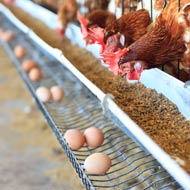Beak trimming will not be banned in 2016

Laying hens have a tendency to peck, which can lead to substantial feather loss, serious injury and even death.
A ban on beak trimming will not be introduced in 2016 after a review of the evidence raised concerns about the impact this would have on bird welfare.
The Beak Trimming Action Group (BTAG) was set up by the government and tasked with finding out if a ban could be introduced next year.
In the UK, infra-red technology may be used to trim the beaks of day-old chicks, in order to prevent injurious pecking. Previously, a hot blade was used to routinely beak trim laying hens, but the practice was banned in 2010.
Laying hens have a tendency to peck, which can lead to substantial feather loss, serious injury and even death when it is directed at the plumage and skin of other birds.
BTAG was formed to explore the management strategies that could be introduced to prevent this, so that even infra-red beak trimming is no longer needed.
After reviewing the evidence, however, the group has advised the government against an imminent ban, as it could lead to outbreaks of severe pecking. As a result, birds may need to undergo emergency beak trimming using the hot blade method, which is a far worse outcome for animal welfare.
Their report states: 'It still cannot be reliably demonstrated that under commercial conditions all laying hen flocks can be managed without the need to beak trim, without a greater risk to their welfare than that caused by beak trimming itself'.
Farming minister George Eustice has confirmed that he has accepted the group's recommendations and will not be introducing a ban.
However, BTAG says this should only be a temporary step and the search for an alternative solution to beak trimming must continue. The group believes there is considerable scope to improve injurious pecking through better bird management strategies.
Their report makes a number of recommendations, including urging producers to create an action plan for implementing the management strategies developed by FeatherWel (www.featherwel.org).
For the full list of recommendations, view the report here: https://www.gov.uk/government/uploads/system/uploads/attachment_data/file/480111/Beak-Trimming-Action-Group-Review.pdf



 FIVP has shared a survey, inviting those working in independent practice to share their views on the CMA's proposed remedies.
FIVP has shared a survey, inviting those working in independent practice to share their views on the CMA's proposed remedies.